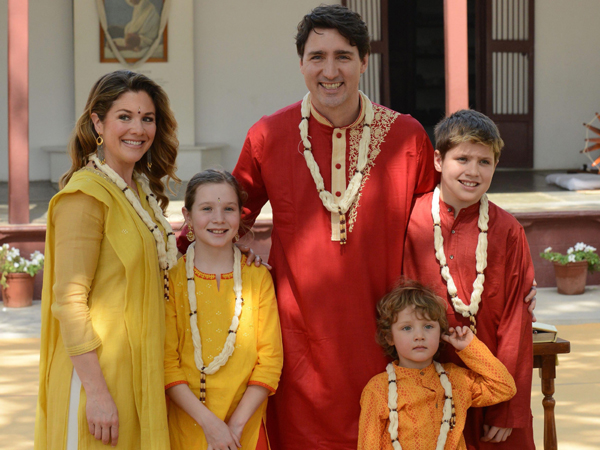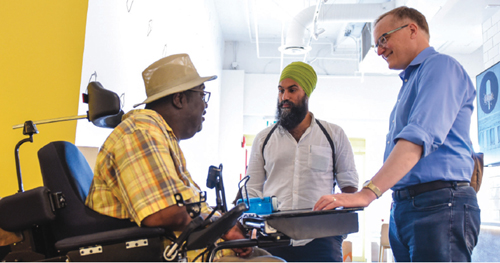
Thursday August 12, 2021 | NATIONAL [Updated at 11:25 pm]
EDITORIAL by Mary P Brooke, Editor | Island Social Trends
Letter in the mail:
Seniors who took the Canada Emergency Response Benefit (CERB) during the pandemic and if self-employed took the Canada Recovery Benefit (CRB), have each received a letter in the mail from the federal government if it was determined that they are no longer eligible to receive some or all of their Guaranteed Income Supplement (GIS).
For most, the key box that was checked in the form letter from Service Canada was this: “Your income … is too high to receive the benefit.” That probably came as a shock to many. What? What increased income?
These letters arrived at people’s home addresses in mid to late July. Across the country this has come as a shock to seniors who receive this additional income support which is calculated based on the person’s income of the previous tax year.
Sudden struggle, taking on debt:
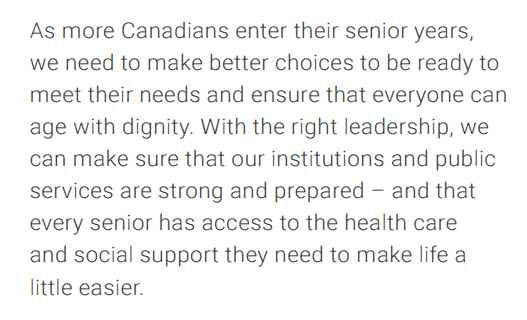
For some, this impacted their ability to cover rent, utilities, health needs or even groceries on very short notice. It’s not like people saved up their CERB payments, they spent them to remain stable during the pandemic.
For some, this will mean going into debt to cover for loss of income.
CERB/CRB was one-time support:
Of course a senior’s income will look like it went up during 2020 if they took CERB or CRB.
But the whole point of CERB and CRB was to make up for a loss in income in other areas during the uncertainty of the pandemic. The lost of GIS now is particularly harsh for people who are self-employed and need the CRB to make up for lower incoming funds as the economy continues to recover.
It’s not as if the CERB/CRB was extra money that made a person richer for the long term. It was to cover for expenses during the pandemic, to which they were legitimately entitled if they qualified through the online application.
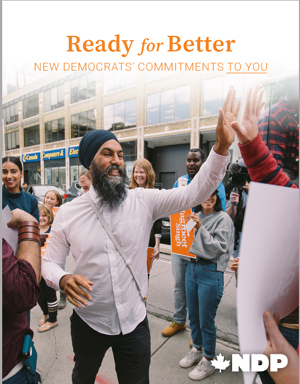
Can this be fixed fast?
Today Island Social Trends asked NDP Leader Jagmeet Singh if this can be corrected quickly, given the country is so close to being plunged into an election. Otherwise, these seniors are suddenly (on just a few days notice) in a much worse financial position to pay rent or any other essential living expenses.
Now that an election is on the very near horizon (the scuttlebutt is that it will be called on Sunday of this coming weekend, i.e. August 15), there will be no sitting House of Commons in which to make legislative changes about the GIS calculation. Presuming the minimum election campaign period of 36 days is chosen by Trudeau, that puts the next election on the calendar for Monday September 20.
Opposition parties discouraged a pandemic election:
For the record, both the NDP and the Conservatives declared a pandemic-season election to be too risky for everyone involved. Island Social Trends was the first to ask Jagmeet Singh that question, during a live scrum in downtown Victoria on July 22.
He later on asked the new Governor General (who was just recently appointed on July 26) if she would say no to a dissolution of parliament (i.e. letting an election go ahead) due to the continuing pandemic.
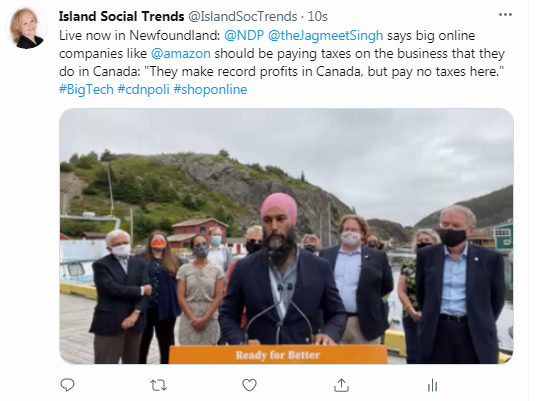
After all, we are now in a fourth wave of COVID-19 right across this country, with rising case counts mostly among unvaccinated and under-vaccinated people age 12+; vaccines are not yet approved for use in children under age 12.
Rationale for an election:
The NDP feels it’s more important to focus on economic recovery, though the Liberals can make a fairly valid argument that they were elected in October 2019 when the economy was much different. They were not elected to spend billions of dollars on short notice in such a wide-ranging way.
This election will be a report card on their performance in handling the pandemic. Do the Liberals think people will usher them in with a majority after how they had to be nudged almost every step of the way by the NDP, to do the right thing for people?
The Liberals could find themselves surprised that people are fed up with the tone-deaf approach to things that really matter to people and how out of touch their approach is in some of their choices (like the We Charity debacle that should have funded jobs for youth across the country but never launched, the SNC-Lavalin controversy, Trudeau taking a family vacation courtesy of the Aga Khan who chairs the Aga Khan Foundation, and Trudeau somewhat offending India’s leadership and embarrassing Canadians by costume-dressing during his family visit to India).
The Liberals have undertaken clawbacks of various types through the tax system over the years (not just the GIS this year), one of which is disallowing some types of medical expenses and also having increased the tax rate for people in higher income levels (around the $200,000 mark, even if that’s by two earners in a household). In many cases it’s a mean-spirited nickle-and-dime approach, quietly behind the scenes in small ways that are resilient to any large number of individuals speaking up about it between elections. The GIS situation might be different, as most seniors are articulate and usually keen to vote.
GIS will likely have to wait:
Any senior who is in this predicament of having a chunk of their *guaranteed* income suddenly pulled out from under them without notice will have to wait until close to year-end before that can be reversed. And that presumes that there would be the political will to reverse the GIS clawback decision.
Provincial benefits that are income-tested based on federal calculations (such as the SAFER rental housing supplement for seniors in BC) are likely to also be impacted in a domino effect. Therefore the GIS clawback is not a singular scenario; exacerbated scenarios of relative poverty loom for many seniors in this GIS-clawback predicament.
Why should seniors suffer?
Why should seniors be paying the price for a gross misjudgment on the part of the Liberal government? The GIS clawback really is a jaw-dropper.
Enforcing a significantly reduced income is a head-shaker, especially in light of the presumed compassion of issuing CERB/CRB in the first place.
Primarily this indicates that Trudeau didn’t grasp the true need of low-income people for truly needing CERB/CRB at a time when so many things were scary and uncertain in the first year of the pandemic. It’s a hard edge to see in a political leader, and certainly is revealing about someone who campaigned as having ‘listened to the people’.
Trudeau’s privileged life experience has not given him the opportunity to experience financial hardship, so he can’t really know. Within the parliamentary context, he can be given credit for listening to the NDP in situations where he will never have his own lived experience of how most Canadians really live in this country. He had the heart (or saw the political expediency) to let Singh essentially take the lead with really helping Canadians during the pandemic. NDP set the tone and Liberals wrote the cheque.
Majority Liberal government would be bad news for GIS-clawback reversal:
If the Liberals win a majority in the election that is likely to be on September 20, reversal of the GIS clawback is far less likely than if the NDP achieve a higher number of seats their current 24 (and thereby still have powerful sway in a minority government scenario). If the Conservatives win a majority there’s likely no hope of ever seeing the clawback reversed.
It should be noted that — similar to what happened in the BC provincial election in September 2020 — if a large number of Canadians use mail-in ballots, it could be several weeks before the full results of the election are known; the country will run with a ‘caretaker government’ with no new legislation. This could leave GIS-impacted seniors to nearly year-end before there is a correction in the judgement error that the Liberal government has made with this decision.
Regardless of one’s view of whether CERB should be considered full income for a low-income test (re the GIS), the clawback shows a total eclipse of political sensibility by the Liberals. Seniors are not going to neglect this at the ballot box.
Essential income:
The GIS is not a bonus, it is (as the name declares) a supplement, to make up for what the senior needs to make ends meet.
GIS eligibility is income-tested (i.e. issued in the current year based on income in the previous tax year). But CERB/CRB was not an increase in income for the long term; it’s not like someone got a job that put them into a new income bracket or their self-employment business suddenly had more sales that are sustainable.
CERB and CRB were issued during a crisis, to help the overall society and economy weather the storm of the pandemic. CERB at $2,000 per month kept many people from having to use food banks, or go into personal debt, or spiral into despair over financial worries when they had other worries (such as family members who might have been ill, or someone in the family who lost their job and had to move in with their elderly parents, or simply coping with the loneliness of isolation before COVID vaccination changed that scenario).
Speaking up about it:

NDP Leader Singh said today that his party has written a letter “demanding this change immediately”. That letter was sent from NDP critic for Employment, Workforce Development and Disability Inclusion, Daniel Blaikie on August 3 to the Minister of Employment, Workforce Development and Disability Inclusion, Carla Qualtrough, as well as to the Minister of National Revenue Diane Lebouthillier and the Minister for Seniors Hon Deb Schulte. [See full text of letter here]
No response yet. Tight timing now, with one day to the final hour of the 43rd Parliament of Canada that is this weekend.
Locally here on Vancouver Island, Alistair MacGregor, MP (Cowichan-Malahat-Langford) told Island Social Trends last week that he is “surprised that no one in the government could see this was going to be an issue”. He has been receiving letters from constituents regarding the loss of GIS income: Letter 1 | Letter 2
“What’s happening is literally horrible,” Singh said today with revulsion over the whole idea of the GIS clawback.
A party spokesperson says not only are the NDP calling on the government to reverse the GIS decision, but also to undo the reduction in the CRB. “In the longer term we are committing to a guaranteed livable income, starting by lifting every senior and person living with a disability out of poverty.”
Liberals going after vulnerable seniors:
“We’ve got Justin Trudeau who’s going after vulnerable seniors, people who receive GIS are among some of the most vulnerable, poorest seniors,” said Jagmeet Singh today.
Singh made a comparison: “At the same time we’ve got hundreds of large corporations that took public money that we clearly can prove paid out dividends to their shareholders; maybe they didn’t need to take that money in the first place. Justin Trudeau is letting those companies off the hook. They’re not getting any letters in the mail saying they have to repay the public money… the millions and millions of dollars that they took.”
To further iterate the problem: “But a senior that needed CERB to get through this pandemic, is getting a letter to say their GIS is being clawed back. That is just offensive, it’s so wrong,” said Singh. He wants it reversed immediately.
Going to have to wait:
But not likely will anything change for seniors impacted by the GIS clawback at this time. Which is surprising, as seniors can be relied upon to vote. Why would they vote for a government that has thrown many of them into sudden financial crisis?
A bit of resignation to the current GIS situation is within this comment from Singh. “But it really lets you know what Justin Trudeau is all about. Why would he allow seniors to see their vital resources being cut but allow some of the wealthiest companies to continue to have taken public money and not pay that back.”



